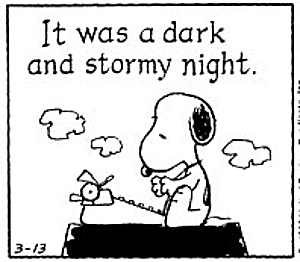The Long View 2005-07-31: Proselytizing; Bad Reviews; Kuiper Belt Trash

I grew up reading Charles Schulz' Peanuts, so any reference to Bulwer-Lytton's famous line immediately brings to mind Snoopy.
Proselytizing; Bad Reviews; Kuiper Belt Trash
Hillaire Belloc is not my favorite Catholic writer. Nonetheless, much of his work remains interesting, not least those pages in Great Heresies in which he prophesies a threat to Christendom from a resurgent Islam: strange thoughts when the book appeared in 1938.
Less strange was this remark:
unconvertible
The missionary efforts made by great Catholic orders which have been occupied in trying to turn Mohammedans into Christians for nearly 400 years have everywhere wholly failed. We have in some places driven the Mohammedan master out and freed his Christian subjects from Mohammedan control, but we have had hardly any effect in converting individual Mohammedans save perhaps to some small amount in Southern Spain 500 years ago; and even that was rather an example of political than of religious change.
From all quarters in recent years, however, we hear that the unconvertibility of Islam no longer holds:
July 28, 2005: The [Indonesian] government continues to investigate, arrest and prosecute Islamic terrorists. But religious conflicts continue as well. More moderate Moslem leaders, while helping the government by preaching against the Islamic radicals, also want government help to stem the growth of Christianity. Missionaries, both Indonesian and foreign, have been successful in converting an increasing number of Moslem Indonesians. The Islamic clergy want the government to intervene. By law, only five religions are allowed in Indonesia, and the government has a tradition of getting involved in religious affairs. While 85 percent of Indonesians are Moslem, most of the remainder are Christian. On some islands, the population is half, or more, Christian. On those islands, many Moslems see Christianity as a more "modern" religion. Christian clergy and missionaries are generally better educated than their Moslem counterparts, and the Christians tend to be more successful economically as well.
Only a fool deploys religion as a geostrategic weapon (which perhaps is why that has been tried so often), but there are lessons that Western governments should draw from this novel development. The most important is that they should do nothing to inhibit proselytism, even if, in the short run, that seems to favor Islam in the West. The real argument against laws that prohibit religious invective is that they interfere with Christian missionary enterprise.
* * *
The current flight of the Discovery is the most depressing manned expedition in space that did not actually include a fatality. Let us leave to one side the fact that NASA still has not yet figured out a way to make that great incubus of a fuel tank safe enough to use, which may put paid to the whole shuttle fleet. The embarrassing thing is that Discovery's primary mission was to examine itself. It's a little like the Clinton Administration's intervention in Haiti, the chief task of which was force protection, not to affect the state of things in Haiti. It's all terribly self-referential.
The space shuttle is said to be the most complicated machine ever built. Did it never occur to NASA that complexity is a bad thing, and that superlative complexity is the worst possible design? There should be a rule for engineering, the Musical Chairs Rule: any engineer who proposes the most complicated machine in the world has to become an accountant.
* * *
Speaking of bad reviews, here is the site of the annual Bulwer-Lytton Bad Writing Award. To tell you the truth, I always thought that the Bulwer-Lytton's famous opening phrase, "It was a dark and stormy night," was pretty good.
Of course, artists might prefer to forgo some examples of critical acclaim, such as this remark from an otherwise glowing review in the New York Times of New Jersey's Ozzfest:
This year's version of Ozzfest came to the arena and parking lot of the PNC Bank Arts Center on July 26...And Mr. Osbourne? Well, he certainly deserves all the applause he gets, though he would scarcely deserve it less if he stayed home.
Not content with that stiletto wit, the Times Book Review section had a pan by Joe Queenan of Edward Klein's The Truth about Hillary that was one of those reviews you have to analyze with paper and pencil to figure out how much the reviewer disliked the book:
What I am saying is that if Klein purposely set out to write the sleaziest, most derivative, most despicable political biography ever, he has failed both himself and his readers miserably. ''The Truth About Hillary'' is only about the 16th sleaziest book I have ever read. Though, in fairness to the author, reading creepy, cut-and-paste books is my hobby.
This overloads my nuance processor, but it looks like an attempt to dissuade people from reading the book.
* * *
There is more to life than nuance; there is also mere error. William Safire notes this textual anomaly in the United States Constitution:
But in the next paragraph, arranging for the ousted president to seek to reclaim his office, Congress's power to block his return can be triggered by ''a majority of the principal officers of the executive department'' -- with no s after ''department.'' Why the difference?
There is no reason. The error slipped into a late draft of the text. One of the principals involved in passing the amendment discovered the mistake, but too late to correct the text that was sent to the states for ratification.
When I worked for West Publishing, I ran into problems like this every couple of weeks. The company had the contract to edit the United States Code, but the contract did not gives us the authority to correct the language of statutes, even for the most obvious error. The drill was that the editors would note these anomalies and send a message about them to, I believe, the Office of the Congressional Legislative Counsel. That body would collect this information and incorporate it into the reenactments of the titles of the Code, something Congress did once in a while to eliminate contradictions and redundancies. I myself once sent a note pointing out that the government of Italy was still being styled "the Kingdom of Italy" in the title of the Code that dealt with foreign relations.
I have always loved donkey work; hence my preference for HTML editing,
* * *
A final mistake: it has become clear that the status of "planet" was improvidently granted to Pluto. Look where it leads:
Astronomical detective work led to the stunning discovery of a large new world beyond Pluto -- and hiding in plain sight. The object could be the biggest in the Kuiper belt of rocky objects that orbit the outer reaches of the solar system.
There are now subversive astronomers who say that there are at least 20 planets in the Solar System, a dignity that they are willing to grant to any object massive enough for gravity to shape into a sphere. And that's only a provisional number; they are willing to expand the class to include any amount of Kuiper Belt trash, a species to which Pluto clearly belongs.
Enough of this: There are eight planets in the Solar System. Eight. No more: not now, not ever.
Copyright © 2005 by John J. Reilly



Comments ()